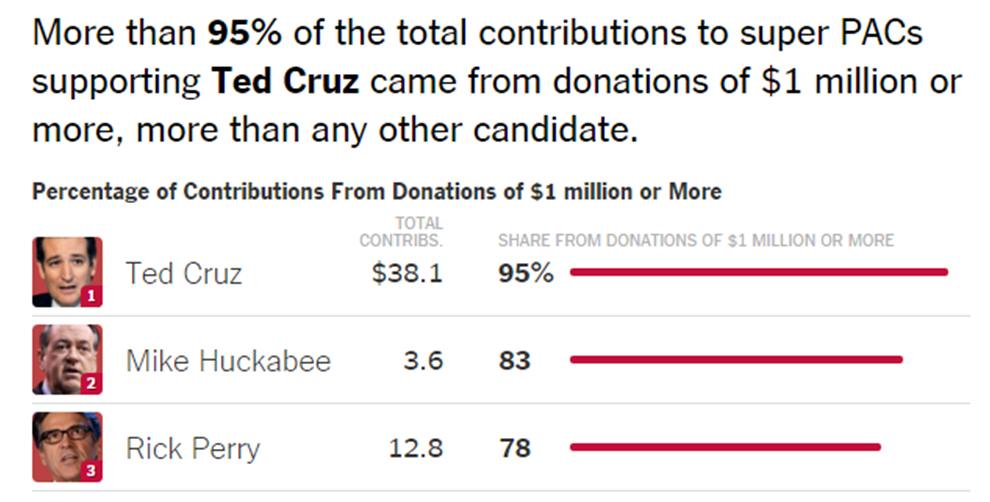-
Posts
6,667 -
Joined
-
Last visited
-
Days Won
4
Everything posted by PN-G bamatex
-
2016.
-
The "establishment" was behind the candidate that could win. Mark my words, Donald Trump cannot and will not win the presidency of the United States.
-
Y'all better get used to the words, "Madam President," because we're all gonna be saying 'em a lot more after November.
-
Ted Cruz isn't half the man Ronald Reagan was.
-
Buddy, that's no conspiracy theory.
-
What you heard was correct. Make no mistake, the establishment does not like Ted Cruz, and frankly, they have very, very good reason not to. But Ted Cruz will set the party back a decade whereas Donald Trump will send it down in a blaze so cataclysmic that it will go down in history as the most divisive end to any American political movement, ever. Between those two poisons, the establishment will pick the former.
-
^ That, and as much as I hate to say it, in American politics, there are some people who are just made of Teflon.
-
Not that it's hard to do or anything.
-
On the bright side, he won Minnesota. No more of that "he hasn't won anything" crap.
-
I'm just saying, if it's Hillary versus Trump, I'm voting for Gary Johnson.
-
Super PACs are supposed to be independent, although as pointed out in a previous post, they often trade staff with the campaigns, employ friends or big financial backers of the candidate, etc. I'll be fair. Where his campaign is concerned, Cruz has one of the best grassroots operation in the race. He's received more small donations as a proportion of his overall fundraising total than any other GOP candidate. But the truth is the polar opposite with respect to the Super PACs that support him. And you'll notice that in that same metric, Rick Perry places third, and he hasn't been in the race for months. Here's a friendly word of advice. If you ever want to find out who really makes the tea party movement in the State of Texas work, take a drive around Uptown the next time you're in Dallas. You're bound to run across seven or eight of 'em. The candidates may come from Houston, but the money comes from the Metroplex.
-
World travelers? One of them's never even left the country. And that's beside the point, which is that a couple of Libertarian economics grads aren't going to go for anything even remotely resembling a "central planner." Which, by the way, isn't inextricably tied to government spending; we don't have a centrally planned economy right now despite the spending, and we've had quasi-centrally planned economies during war efforts in which we spent less than we do now. In any case, you have more reason to believe Rubio's sincerity with regard to the debt based on his actual record than you do Cruz.
-
When, exactly, did Rubio advocate for central planning? I'm pretty sure my two hardcore Rand Paul-supporting, super Libertarian, economics grad student best friends wouldn't be going for Rubio since Rand dropped out if he was a central planner. Oh, that's right, he's not. That's just another dirty, *untrue* tagline Cruz supporters like to throw around.
-
Dude, I don't even like Kool Aid. I haven't "drank" anything. I didn't decide to "settle" for Rubio this past week, or this past month, or even this past year. I knew I would be voting for Marco Rubio one day when I watched his victory speech after winning his Senate seat while I was still a senior in high school back in 2010. I posted on this very site in 2012 that if Mitt Romney didn't win, Marco Rubio would be the next President of the United States. I stand by that now. My mail in ballot was sealed in its envelope with the box beside Rubio's name filled in days before the South Carolina primary even took place. My support for Rubio isn't engendered by the fact that he's a conservative candidate for president that's actually electable, it's merely bolstered by it. I agree with Marco on more issues than any other Republican candidate. I knew that when this race first started, but took the ISideWith policy test anyways just to quantify it. I agreed with 96% of his policy positions. Furthermore, I disagree with your contention that he won't do anything to slow the rate of spending. Marco cut the built in bailout fund for health insurers out of Obamacare. That's more of a cut than Ted Cruz has ever come close to passing. Where the border's concerned, that evil, unpalatable "Gang of Eight" bill included massive increases in the number of Border Patrol agents on the southern border - a part of the bill Marco continues to campaign on now. Cruz has never proposed a single piece of legislation that would do anything to shore up border security. Oh, and about the Cruz campaign firing that guy, they never fired Dan Gabriel or their high-ranking fundraising official that got caught cheating on a law school exam. I wonder why that is? Oh, that's right, because it wouldn't yield a PR boost.
-
On the contrary. I'll refer you to my previous post on this very subject. And that was before the video accusing Rubio of insulting the Bible, or the photoshopped picture with Obama, or the fake Facebook page impersonating Trey Gowdy that said he was no longer endorsing Marco.
-
No, I get your point. I do. I'd bet very, very good money that I'm a lot more involved in politics than you are. I know that head-to-head polls aren't always the best long term indicators of a candidate's success. What are good indicators, though, are favorability polls, in which Ted Cruz comes in ahead of absolutely nobody but Donald Trump, while both Marco Rubio and John Kasich post numbers that are, not surprisingly, as good as or better than the two potential Democrat nominees among general election voters. And if you'll notice, I didn't pick any "squishy," moderate candidate. I picked Marco Rubio, whose conservative bona fides are every bit as strong as Ted Cruz's (arguably stronger in certain areas). If I was going for "squishy" candidates, Ted Cruz would be my man. I mean, how could I pass up on this face?
-
I hate to break this to you, but you are every bit as delusional as Ted Cruz himself if you think he's the new Ronald Reagan.
-
Back to the thread's original question.... No, Donald Trump cannot beat Hillary Clinton, and I seriously, seriously doubt Ted Cruz could either. Trump can't even beat Sanders, and Cruz has a coin flip's chance. All of the polling indicates that this party has (barring disaster) two sure things right now: Marco Rubio and John Kasich. If this party has any sense left at all, Marco Rubio will be the nominee in November. Otherwise, y'all better get ready for four more years of a Democrat in the White House.
-
Jeb and Marco are from the same state. That's a common occurrence between candidates from the same state. Ted Cruz got a big fundraising boost from Rick Perry's donors when he dropped out. Though if you're really concerned about money.... [Hidden Content] ... you might want to see this.
-
Well, Bush dropped out and Kasich stayed in. I guess I called that one bass ackwards.
-
Bob Dole showed regret over his endorsement of Bush in an interview today. I think when the South Carolina results are final and Bush isn't even in the top half, the donors are done with him.
-
Did they really put Livingston back in our district?
-
I disagree. Every poll out of South Carolina I can think of has put Kasich in the bottom half among the current GOP contenders. The most recent one, released today, put him in last place with 7% of the vote. If those numbers hold up, I think Kasich is out for sure after South Carolina. The question will be what Carson and Bush do.
-
It depends on how quickly the other candidates in the race drop out, in my opinion. If Carson, Jeb and Kasich all drop out after South Carolina, my thoughts are that Rubio supplants Trump as the first place contender and that Cruz gets a mild boost as well. I also think that the moment we know for certain that Trump's no longer in the lead, the appeal of a candidate who bases everything on his reputed success and knack for winning at whatever he does collapses. If, on the other hand, too many candidates stay in for two long, Trump's chances of being the nominee go up dramatically. Now, which case is more likely? I just don't know. Jeb seems obsessed with his candidacy, and he's got a lot of money sitting around. I don't think he's got a chance in heck of winning the nomination, but I do think there's a good chance he'll ride this thing out until the very end for no other reason than that he's so attached the family legacy and doing what his father and big brother did before him. I think there's a good chance Kasich drops out after South Carolina. As for Dr. Carson, I really just don't know. Of all the anti-establishment candidates, there's a good argument to be made that Carson's is the most unorthodox in terms of how his campaign is run. It's certainly the hardest to read. No move or decision his campaign makes, in my opinion, comports with standard campaign practice in any way. What you would normally take as a sign of his campaign being over is really just him going home to get a change of clothes. That's just the story of the Ben Carson campaign. That said, as hard as it is to figure out what Carson will do next, one thing is for certain: the longer he stays in, the longer he's a thorn in Cruz's side. When the moment comes and Carson does finally drop out, I fully expect him to endorse someone other than Cruz, and that's going to really shake up an evangelical GOP base that Cruz is already having trouble getting through to.






